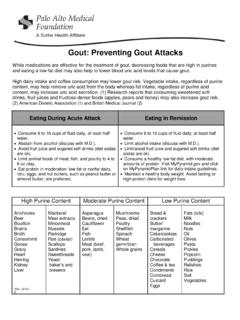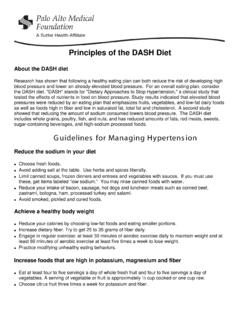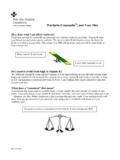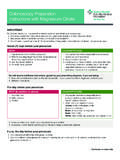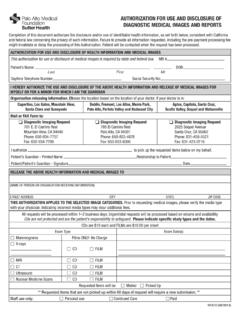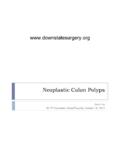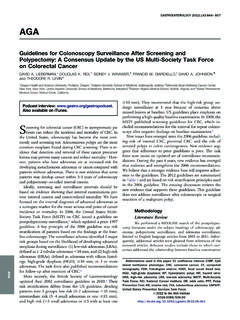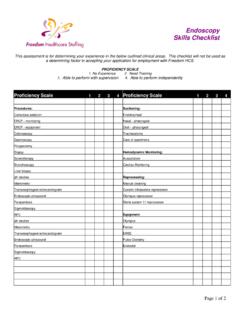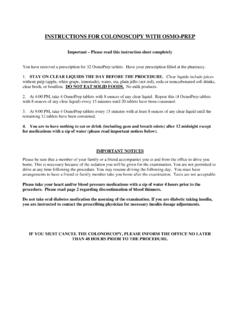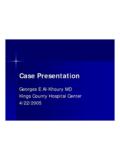Transcription of Colonoscopy Morning (AM) Preparation …
1 Colonoscopy Morning (AM) Preparation instructions with SUPREP IMPORTANT: For the best results and to prevent the need to cancel or reschedule your Colonoscopy : 1. Follow only instructions given by your gastroenterologist or on this instruction not follow instructions from any other source, including instructions that come with your SUPREP (7) days before your procedure STOP: OKAY/APPROVED: regular medications (especially bloodpressure and/or cardiac medications) (Tylenol) such as meat (chicken, pork, beef), fish, tofu, unless prescribed by a including: Ibuprofen (Motrin, Advil), Naproxen (Aleve, Naprosyn) and similar , fish oil and vitamin seeds, nuts, popcorn white bread, white rice, noodles, yogurt, fruits andvegetables (remove skin and seeds), pasta, eggs,pancakes, cheese and dairy productsYou will receive additional instructions , guided by your prescribing physician, if you are taking: Blood thinner medications such as Warfarin (Coumadin), Heparin, Lovenox, Plavix, Aggrenox, Ticlid, Pradaxa Diabetes medicationsThe day before your procedure STOP (in addition to above): OKAY/APPROVED: 1.
2 Any solid regular medications (especially productspressure and/or cardiac medications) (Tylenol) and clear liquids including:Juices: apple, white grape, whitecranberry, lemonadeBroth: chicken, beef or vegetableSoda: 7- U p, C o ke Other: black coffee, tea, popsicles, jello, sports drinks Eating any solids may result in your procedure being cancelled. Make sure to drink clear liquids throughout the day to keep yourself the day before your procedure: Drink first dose of SUPREP solution. 1. Pour one (1) 6-ounce bottle of SUPREP liquid into the mixing cool drinking water to the 16-ounce line on the container and all the liquid in the must drink two (2) more 16-ounce containers of water over the next on back side The day of your procedure The day of your procedure Continue your clear liquid diet.
3 Take your regularly prescribed Morning medications (with a small sip of water) unless instructed otherwise. 5 hours before your scheduled procedure time: Drink the second dose of SUPREP solution. 1. Repeat steps 1 through 4 above using the other 6-ounce bottle. 3 hours before your scheduled procedure time: No eating or drinking until after your procedure. Additional Important Information Regarding Your Colonoscopy Before your procedure While drinking the Preparation medication: 1. To improve the taste of your Preparation medication try 1) adding a citrus-flavored powdered drink packet; 2) chilling it before drinking; 3) licking a lemon or lime wedge after taking the drinks; or 4) using a straw.
4 2. Consider using petroleum jelly or diaper rash ointment around the anus before starting the prep and after each bowel movement to minimize irritation from passing many bowel movements. 3. To prevent dehydration, drink plenty of fluids before (as instructed above) and after the procedure. Your body can lose significant amounts of fluids during the bowel Preparation . 4. Feelings of bloating, nausea, abdominal cramping or chills are common. This should decrease over the course of the bowel Preparation . 5. If you develop severe nausea or vomiting, stop drinking the bowel prep for 30 minutes, and then start again once you are feeling better. Transportation Reminders 1.
5 You must arrive at your given location one (1) hour before your scheduled procedure time. Your entire stay will be between two to three hours. 2. You are not permitted to take a taxi, operate any mode of transportation yourself or use any public transportation to get home after the procedure. A responsible adult will need to drive you home, and someone should stay with you for at least two hours to make sure there are no issues following the sedation or procedure. What to expect upon arrival for your procedure 1. Prior to the procedure, a nurse will ask you questions to ensure that you understand the procedure and the reason for it, and to ensure that you prepared properly for it.
6 The gastroenterology doctor will also review the procedure with you. 2. The nurse will start an intravenous line to administer medications. The intravenous line is similar to having blood drawn. Your vital signs (blood pressure, heart rate, oxygen saturation) will be monitored closely before, during and after the procedure. 3. The Colonoscopy will be performed while you are lying on your left side. Medications to help you relax (sedative) and to help with discomfort (narcotic) will be administered intravenously. Some people sleep during the examination, while others are very relaxed, comfortable and awake. This is not general anesthesia. After the procedure 1.
7 Rest for the remainder of the day for your health and safety. 2. Do not participate in any activities that require coordination or judgment. You may return to regular activities the day after the procedure. 3. Because there is a small risk of bleeding for up to two weeks after a polyp is removed during a Colonoscopy , please inform your physician if you plan to travel by air after your procedure. We discourage booking an international flight within two weeks after your Colonoscopy due to the small chance that a large polyp is removed during the procedure and your physician recommends cancelling the flight. 4. Some bloating, gas or mild cramping is normal and should diminish.
8 5. At the conclusion of your procedure, you will receive specific information about findings, post- procedure instructions and precautions. Frequently Asked Questions about Colonoscopy What is a Colonoscopy ? A Colonoscopy is a routine and commonly performed procedure, in which a highly trained doctor (called a gastroenterologist) inserts a colonoscope (a flexible tube containing a camera at the tip) into the rectum and colon (large intestine) to carefully inspect the colon. The scope is about the width of your finger, and the procedure is typically painless, as patients are sedated. A typical Colonoscopy takes about 20 to 30 minutes. Why is a Colonoscopy recommended?
9 Your physician has recommended that you get a Colonoscopy . The most common reason to have a Colonoscopy is as a screening test for colon (and rectal) cancer. Colorectal cancer is the third leading cause of cancer deaths in the United States; the average risk for developing colorectal cancer is about 6 percent. Colonoscopy is a safe, proven and effective means to detect colon cancer. Colonoscopy can also be useful for the evaluation of conditions, such as bleeding, chronic diarrhea and anemia (low blood counts). What is a polyp? Polyps are abnormal growths of tissue that form on the lining of the colon. Polyps are almost always benign. While many benign polyps are harmless, others are considered precancerous.
10 Precancerous polyps carry the potential to turn into cancer. They are generally slow growing, so a small precancerous polyp may take 10 to15 years to turn into cancer. Approximately 30 percent of people over the age of 50 have precancerous polyps. Colonoscopy permits the early detection and removal of polyps. Because almost all colorectal cancers start as small polyps, the removal of these polyps at the time of Colonoscopy is an effective means to prevent colorectal cancer. The removal of polyps (polypectomy) is a painless procedure. What can I expect during a Colonoscopy ? A Colonoscopy is generally a well-tolerated procedure. Most patients are given a sedative and pain medication through an IV that is placed by the nurse before the procedure.
